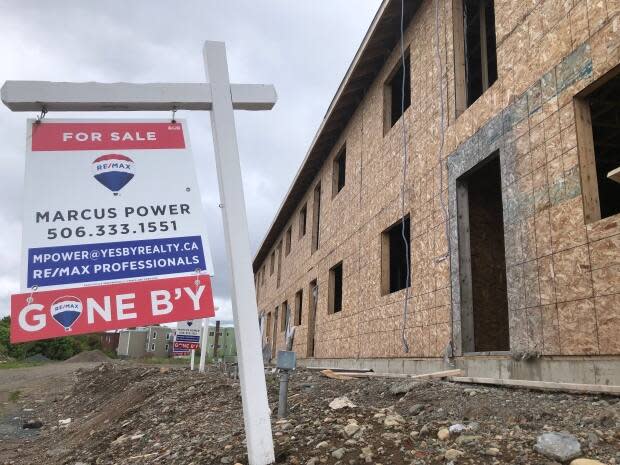N.B. home prices still rising but not at same pace, association says

Prices of homes in New Brunswick are rising at a steady pace while large declines are reported in Canadian cities to the west, according to newly released statistics.
In a report Monday, the Canadian Real Estate Association said the average home price was $629,971 in July, compared with June's average price of $665,850. The drop is steeper when the Greater Toronto and Vancouver areas are removed from the figures.
However, in the Atlantic region, prices are mostly continuing to rise but at a slower pace, according to Shaun Cathcart, the association's senior economist.
In the Fredericton area, the benchmark price of a home rose from $296,100 in May 2022 to $305,900 in July 2022.
A more affordable place
One reason New Brunswick's prices have not cooled off the way they have elsewhere is that real estate in the province is "much more affordable," Cathcart said.
"Even if you're getting stressed tested for a fixed rate mortgage at seven per cent, it's not going to be a big hurdle to overcome."

The association said national home sales declined by 5.3 per cent in July 2022, and the volume declined in New Brunswick as well.
But prices didn't, Cathcart said.
"I think the big reason behind that is you still have a big shortage of supply, and it's still very easy to get a loan to buy real estate in New Brunswick," he said.
Small dips in Saint John, Moncton
Saint John and Greater Moncton saw "almost imperceptible" dips in prices in July 2022.
The benchmark price of a home in Greater Moncton has gone down from $340,900 in May to $337, 700 last month. In Saint John, the figure dropped to $291,900 last month compared with $294,000 in May.
"A couple of thousand bucks, you know, on an asset that's increased by [$100,000] or $200,000, in the last couple of years, is very, very small," said Cathcart.
The decline in prices seen in parts of Ontario and British Columbia are gains that were made just this past winter during a short and sharp peak in housing prices, Cathcart said.

"Whereas in Quebec, and the Prairies, in the Maritimes, housing is relatively more affordable, people are less likely to run up against the stress test when rates rise. And so things have continued to grow."
Watching and waiting
Cathcart added that people looking to buy homes, especially those buying for the first time, go to the sidelines until they see what happens with borrowing costs and prices.
"A lot of other people are going to go to the sidelines for a time, especially during the summer, and say, 'Hey, let's just take a step back and see what happens here.' So when the dust settles, and, you know, certainly we're still sort of in the middle of that."
The association's report shows the housing market is continuing to stabilize after two pandemic years that saw record-setting sales prices and selling volumes.


